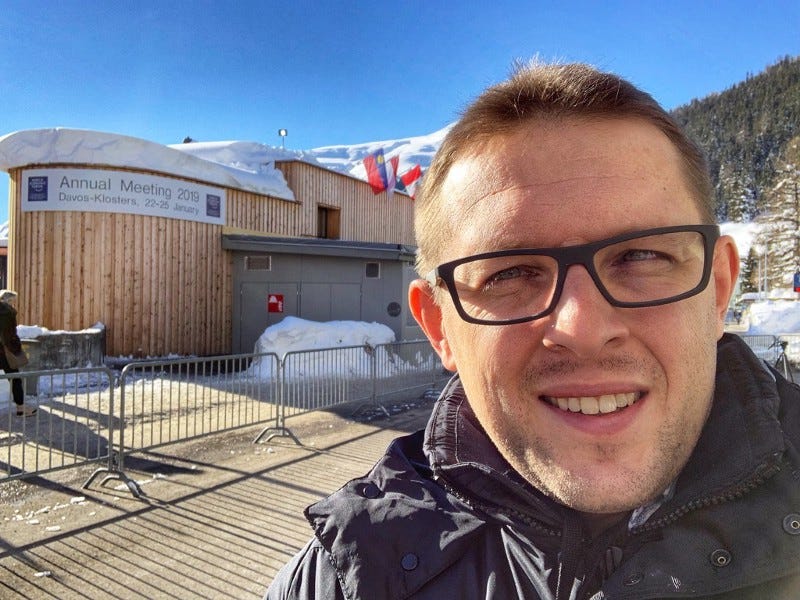Thoughts from Davos: two months later
Every year, world’s leaders get together at the World Economic Forum in Davos. Here are my notes from this year’s meeting.
I was excited to join the Davos activity this year. To me, visiting the World Economic Forum is an opportunity to network, learn, and take a fresh perspective on the world. I had the privilege to represent QUT Business School and its Chair in Digital Economy. Two months later I decided to capture some of my observations. Here are my thoughts, triggered by the fantastic people I met, the information I learned, and the new perspectives I took. All captured through a lens of someone being passionate about the digital economy and industry 4.0.
Globalisation 4.0
The theme of the World Economic Forum 2019 was Globalisation 4.0. Fuelled by trends such as the Fourth Industrial Revolution (4IR), Globalisation 4.0 requires us to rethink our worldview. WEF 2019 recognised that there is a difference between globalisation and globalism and focused on ensuring everyone feels secure at home to be able to open up to the world.

The fourth industrial revolution (4IR) was on everyone’s minds.
Corporations like countries and countries like corporations
A stroll through Davos, the village in the mountains, revealed something that is a sign of our times. The shops of Davos turned into display and event spaces. There were two types of owners of the spaces: governments (India, Ukraine, Russia, or Poland, among others) and large corporations (Facebook, Google, SAP, and many others). This dichotomy is significant. The only question is what exactly it signifies: the rise in power of technology companies or the drop in importance of national governments.
Resilience in uncertainty
It’s not only the confusion about the role of governments or corporations anymore. There is no doubt our world is highly uncertain. Not just from a business perspective, with entire industries facing disruption, but also from a socio-political perspective. Participants of Davos spent a lot of time discussing and orchestrating initiatives in this space. I attended sessions on water scarcity and the global waste problem. Circular economy conversations matured and evolved — from niche discussions to mainstream debate. Many other sessions focused on the changing geopolitical landscape and the need to respond to as well as prevent humanitarian crises. The common thread through all these discussions was the focus on the need to build resilience. QUT’s research on Revenue Resilience is highly relevant here.
Staying connected in the disconnected world
The more we understand about the Internet, the Digital Economy, Artificial Intelligence, Internet of Things, the more we understand the need for human interactions and ensuring that the quickly evolving technologies can only benefit humanity, if humanity stays involved. We could hear it between the lines of every conversation. AI experts, such as Kai-Fu Lee could be heard speaking about the importance of human emotions in the world of artificial intelligence. I expect these voices will become even more audible.

It could be -10°C outside, but the atmosphere was hot!
The world is changing
World Economic Forum conversations are focused on topics that are important for and impact the global economy. This year, WEF added eight new areas of focus (insight areas): 3D Printing, Agile Governance, Circular Economy, Humanitarian Action, Internet of Things, Mining and Metals, Oil and Gas, and Space.
Topics such as 3D Printing, Internet of Things, and Space are clearly showing the optimism around emerging industries, and their potential to positively impact the world. It is not all that gloomy. Each of these three areas opens up amazing possibilities for businesses and nations to grow.
Agile Governance, Circular Economy and Humanitarian Action stress the need for the world leaders to focus on trust, responsibility, and long term planning. There were media reports about the irony of the 1500 private jets (a “record” number) bringing top executives to Davos, and the forum’s focus on sustainability (as pointed out by Rutger Bregman). WEF responded to these rumours by providing detailed statistics about 1050 jets, compared to 1171 in 2018. Still, the number is staggering. (Disclosure: I drove to Davos from Germany. I combined it with another trip — speaking at DLD Munich.)
Finally, Mining and Metals, as well as Oil and Gas, became new insight areas. Perhaps surprisingly, given the history of these industries. Perhaps less surprising given the challenges, and opportunities, ahead of these two.

Even though the article is two months late, I started capturing these notes already in Davos — here in the Sustainable Development Goals tent, just outside of the Davos Secure Zone.
Digital Economy
In my role as the head of Chair in Digital Economy, I am particularly interested in the discussions in this space. And it is an exciting time! 2019 is the year of the 30th birthday of the World Wide Web. I still remember using the Mosaic web browser, as a 15-year-old kid, in the early years of the Internet, to access Altavista, Lycos, or Yahoo. The world we live in now was unimaginable back then. It is a strange world though. Soon most of the global GDP will be digitised. At the same time, there are many concerns about the negative impact of the Internet on the lives of individuals. And the World Economic Forum conversations in Davos focused around six areas of interest, with their detailed descriptions on WEF’s webpages.
Good Digital Identities
How can we help individuals benefit from accessing digital services, whether public or private, without risking the emergence of an Orwellian state? We heard this question a lot in Davos. It seems we are still away from the answer though. At least we know that blockchain is not the answer; it seems.
Data Sharing and Permissions
In the world where everyone collects our data (“we” being individuals or businesses), and data that “our” devices produce is often not even available to us, how do we ensure the safe and responsible use of it? This theme will keep governments, social groups, and businesses on their toes.
Sustainable Digital Transformation
The ongoing question in the digital economy is how to ensure sustainable digital transformation. In the world where almost no one can see the next disruption from around the corner, how do we build resilience and respond to threats, as well as capitalise on opportunities? In 2018, it is estimated that more than $1.2 trillion was spent on digital transformation efforts. Some believe that only 1% of these efforts will achieve the goal. How can we learn from others and not reinvent the wheel each time? It seems that often organisations are left to themselves in this process.
Securing People and Processes
Cybersecurity remains the top concern, and recent cyber attacks and cyber threats remind us that perhaps we are still not paying enough attention to the risks in this space. We do not have enough experts in this space, regulation is not adequate, and the innovative spirit of “move fast and break things” is counterproductive. WEF focused on the need for joining efforts in addressing the cybersecurity risks.
Informed, Agile Governance
2018 was a year of lost trust. We lost faith in digital businesses, but also in regulators, who were supposed to protect us from at least some of the major disasters in the digital space. In Davos, the participants focused on developing new governance approaches to respond to technological changes quickly, and exploring new ways of policymaking, such as regulatory sandboxes and even crowdsourced policy decisions (which sounds very much like democracy, implemented using technology).
Access and Adoption
While we are all excited about more than half of the world’s population (51.2%) connected to the Internet, the other perspective is that just below half of the world’s population does not have access to the network. The digital divide is vast, and the world’s leaders need to work together on bridging the gap. Initiatives helping ensure access to the Internet globally were on the Davos agenda.
Is it worth attending the annual meeting of the World Economic Forum in Davos? It depends on what you would like to achieve. The actions that change the world for better do not take place there. But such activities can be triggered by the conversations that happen during long sessions in Switzerland’s mountains. And one thing is certain — whatever happens in Davos, does not stay there, but instead, it starts snowballing and impacts the world. Perhaps this is one reason the forum occurs in the mountains in the middle of winter.



